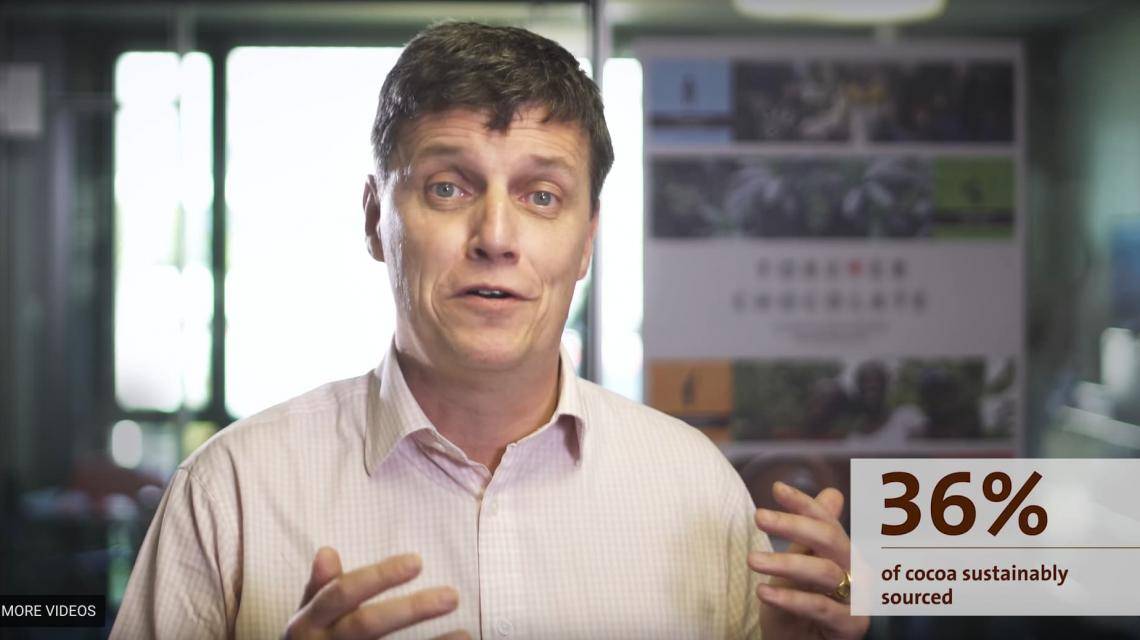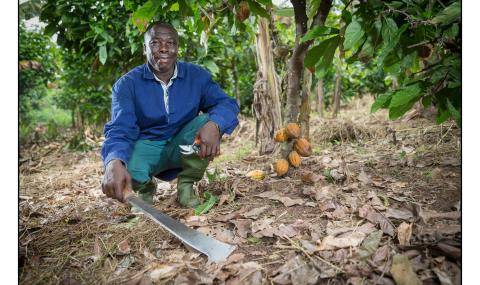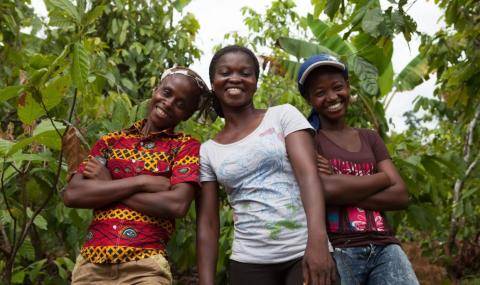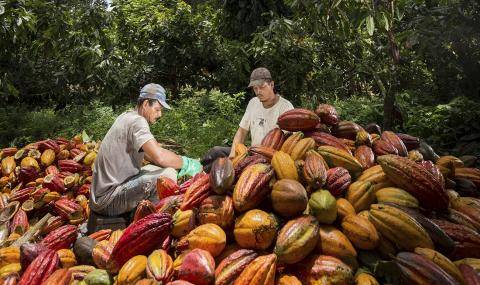Barry Callebaut publishes progress report Forever Chocolate 2016/17
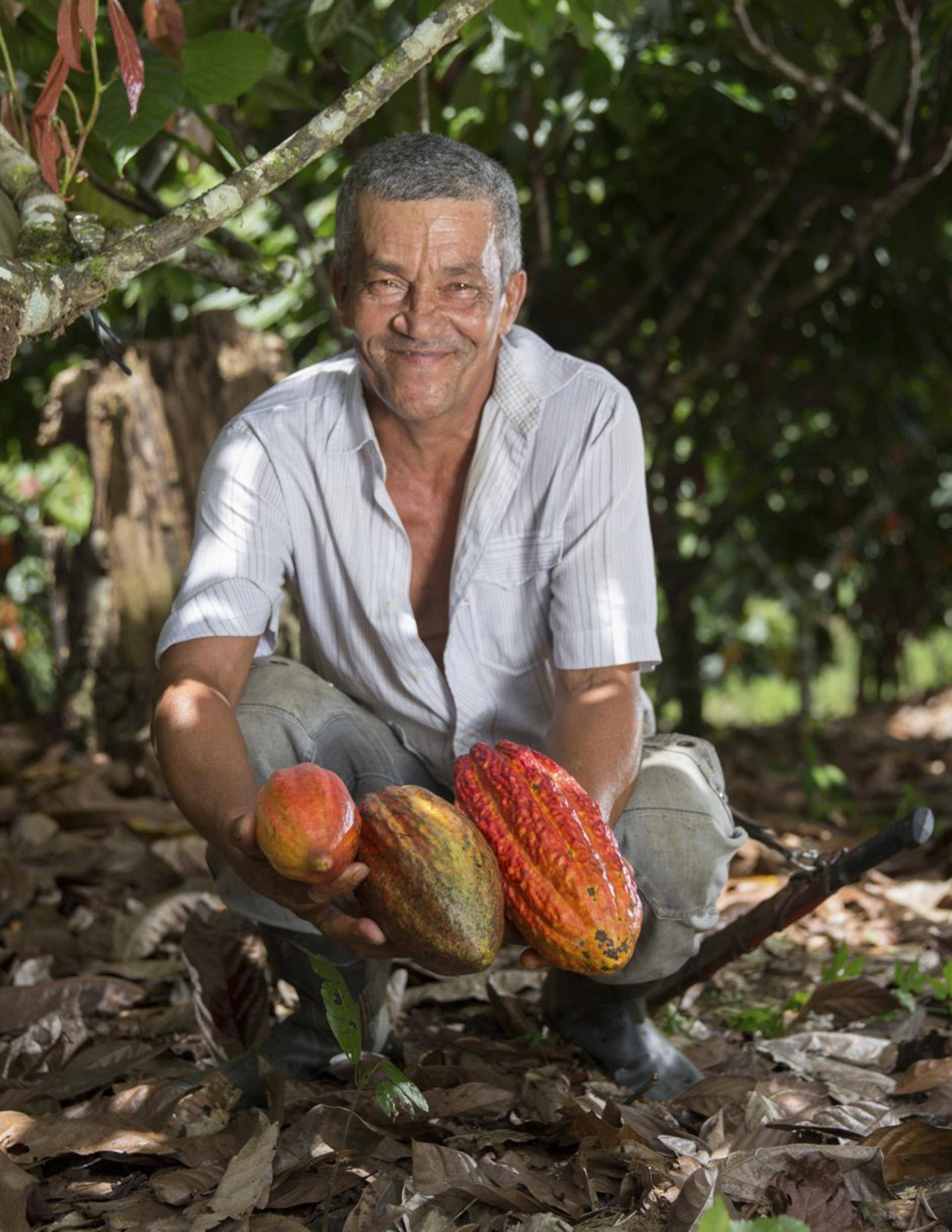
Barry Callebaut publishes progress report Forever Chocolate 2016/17
- Working with about 157,000 farmers in sustainability programs;
- Over 20,000 farmers trained on child labor awareness
- +23% productivity improvement/ha for Ivorian cocoa farmers adopting farm services
- Signed Cocoa and Forest Initiative to stop cocoa-related deforestation in West Africa
- 36% of all cocoa sourced sustainably
- 30% of all non-cocoa ingredients sourced sustainably
Barry Callebaut – the world’s leading manufacturer of high-quality chocolate and cocoa products – published today the first Forever Chocolate progress report. It details both the progress as well as the learnings of the journey kicked off a year ago when Barry Callebaut launched its new sustainability strategy “Forever Chocolate” with the ambition of moving sustainable chocolate from niche to norm by 2025. The plan is based on four ambitious targets to be achieved by 2025 that address the largest sustainability challenges in the chocolate supply chain.
- Lift more than 500,000 cocoa farmers out of poverty
- Eradicate child labor1 from its supply chain
- Become carbon and forest positive
- Have 100% sustainable ingredients in all its products
Antoine de Saint-Affrique, CEO of the Barry Callebaut Group, said: “Forever Chocolate requires a systemic change, a new approach to cocoa farming that not only professionalizes farmers but also generates social and environmental benefits to cocoa farming communities. If we cannot resolve the issue of cocoa farmer poverty, we will not reach our other targets. Our data confirms that we are on track. But we neither have all the answers yet as to how to make this happen, nor can we do it alone. Through our Forever Chocolate progress report we extend an invitation to all stakeholders to join us on this journey to make sustainable chocolate the norm.”
Barry Callebaut’s Forever Chocolate progress report was third party verified by Denkstatt GmbH, in accordance with Global Reporting Initiative (GRI) principles.
Milestones achieved in fiscal year 2016/17
Lifting cocoa farmers out of poverty
In order to empower farmers to increase their productivity we had approximately 157,000 farmers involved in one of our sustainability programs on good agricultural practices in 2016/17. Through Barry Callebaut’s Cocoa Horizons program, a total of CHF 7.5 million in premiums was reinvested in cocoa farming communities. Furthermore, Barry Callebaut developed a Farm Services business that offers cocoa farmers products and services that improve their productivity. These packages can be bought by cocoa famers on credit and include training on good farming practices, access to financial services, access to improved planting materials and access to farm inputs. In 2016/17 packages were loaned to a total of 5,814 cocoa farmers. In Côte d’Ivoire, farmers that acquired these packages experienced an average increase in productivity of +23% per hectare.
Eradicating child labor
A structural solution to eradicating child labor is a combination of a) poverty alleviation, b) access to quality education, and c) raising awareness. In 2016/17, Barry Callebaut trained over 20,000 farmers on child labor awareness. To collect data on the prevalence of child labor, Barry Callebaut also started to map its supply chain through a Child Labor Monitoring and Remediation System (CLMRS). In Côte d’Ivoire, 3.2% of the 340 farmer groups the company directly sources from have CLMRS equivalent systems in place. In total, 247 cases of the worst forms of child labor were established in 2016/17. Most cases of the worst forms of child labor found were children helping on the family farm. Remediation meant first of all raising awareness with both the parents as well as the larger farming community. As Barry Callebaut aims to eradicate child labor from its entire supply chain, not just cocoa, a heat map is being created to identify those commodities at risk of including child labor in their supply chains. In addition, the company is updating its Supplier Code to incentivize suppliers of non-cocoa ingredients to have systems in place which are equivalent to CLMRS.
Carbon and forest positive
Barry Callebaut was one of the companies driving the Cocoa and Forest Initiative Frameworks for Action that were signed on November 16, 2017 at the UN Climate Conference (COP 23) in Bonn. These frameworks are intended to eradicate cocoa farming-related deforestation in Côte d’Ivoire and Ghana. This is a unique achievement as there is no other commodity that has united governments, industry and NGOs behind a framework to eradicate deforestation from its supply chain. The frameworks include an end to the conversion of any forest land for cocoa production, a moratorium on the traceable direct sourcing of cocoa from national parks and reserves per January 1, 2018 and the development of an action plan by signatory companies and the Ivorian and Ghanaian governments to eliminate cocoa production and sourcing from national parks and reserves. In addition, the framework also foresees the development of alternative livelihoods for affected farmers.
In 2016/17 Barry Callebaut started mapping 90,000 cocoa farmers in its supply chain, to understand where they are farming and to prevent the company from sourcing from farmers located in protected forest areas. In addition to the mapping of cocoa farmers, Barry Callebaut is creating for all its non-cocoa ingredients a heat map of those agricultural raw materials at risk of contributing to deforestation. The company is also updating its Supplier Code to make sure all non-cocoa agricultural ingredients are deforestation-free by 2025.
In order to become carbon positive by 2025, the company has developed a roadmap to a carbon-positive way of manufacturing, and pilots have been defined for solar and wind energy, focusing on Africa, the United States and Europe. Barry Callebaut is also looking at three other main renewable energy sources: energy from waste, energy from water and renewable energy storage. Barry Callebaut’s CO2e intensity per tonne of average products decreased from 4.4 tonnes in 2014/15 to 4.32 tonnes in 2016/17. This decrease in intensity is due to three factors: energy efficiency activities implemented at factory level, an increased share of renewable energy sources as well as an increased yield rate in cocoa factories (cocoa products output per cocoa bean input).
The number of factories using only renewable electricity sources increased by +7 to a total of 13 factories in 2016/17.
Sustainable chocolate
In 2016/17, Barry Callebaut sourced 36% of its cocoa from sustainable sources. This is an increase of +13% compared to the previous fiscal year. In addition, the Group sourced 30% of its non-cocoa ingredients from sustainable sources.
Forever Chocolate progress report 2016/17
For a full overview of the 2016/17 Forever Chocolate progress results, please visit:
forever-chocolate.barry-callebaut.com/
1 ILO defines “child labor” as work that deprives children of their childhood, their potential and their dignity, interferes with schooling and is harmful to their physical and mental development. Activities such as carrying heavy loads, working with hazardous tools or using chemicals are considered as “worst forms of child labor”.
About Barry Callebaut Group:
With annual sales of about CHF 6.8 billion (EUR 6.3 billion / USD 6.9 billion) in fiscal year 2016/17, the Zurich-based Barry Callebaut Group is the world’s leading manufacturer of high-quality chocolate and cocoa products – from sourcing and processing cocoa beans to producing the finest chocolates, including chocolate fillings, decorations and compounds. The Group runs close to 60 production facilities worldwide and employs a diverse and dedicated global workforce of about 11,000 people.
The Barry Callebaut Group serves the entire food industry, from industrial food manufacturers to artisanal and professional users of chocolate, such as chocolatiers, pastry chefs, bakers, hotels, restaurants or caterers. The two global brands catering to the specific needs of these Gourmet customers are Callebaut® and Cacao Barry®.
The Barry Callebaut Group is committed to make sustainable chocolate the norm by 2025 to help ensure future supplies of cocoa and improve farmer livelihoods. It supports the Cocoa Horizons Foundation in its goal to shape a sustainable cocoa and chocolate future.
